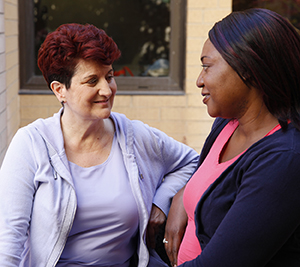Understanding Menopause
Menopause is the point where you’ve gone 12 months in a row with no menstrual period. The average age for this is around 51. But it can happen at younger or older ages. In the months or years before menopause, your body goes through a lot of changes. It can help to understand these changes and what you can do to ease the symptoms that happen.

Symptoms
Perimenopause is the time leading up to menopause. It happens in the months or years before menopause. It can cause symptoms as your hormones change. They may start when you reach your mid-40s. During this time, your estrogen levels go up and down. Then it decreases. As a result, you may have some of these symptoms:
-
Menstrual periods that come more or less often
-
Menstrual periods that are lighter or heavier
-
Worse premenstrual syndrome (PMS) symptoms
-
Hot flashes
-
Night sweats
-
Mood swings
-
Vaginal dryness and pain during sex
-
Trouble going to sleep or staying asleep
-
Lower sex drive and function
-
Needing to pee often
Controlling symptoms
Your healthcare provider may suggest pills or an intrauterine device (IUD) that have the hormone progesterone. This can make your periods more regular. It can prevent excess bleeding. If you have symptoms due to lower estrogen levels, your healthcare provider may suggest pills that have estrogen or progesterone. This is called hormone therapy. There are other prescription medicines that help control some of the symptoms, such as hot flashes, mood swings, and vaginal dryness.
Below are ways for you to help ease symptoms.
-
Hot flashes. Wear layers that you can take off. Try all-cotton clothing, sheets, and blankets. Keep a glass of cold water by your bed.
-
Pain during sex. A water-based lubricant or vaginal moisturizer may help. Your provider may prescribe an estrogen cream for your vagina.
-
Mood swings. Talking with friends who are going through the same changes can help.
Using birth control
You can still get pregnant until 12 months have passed since your last period. Ask your healthcare provider about birth control choices.
Online Medical Reviewer:
Donna Freeborn PhD CNM FNP
Online Medical Reviewer:
Heather M Trevino BSN RNC
Online Medical Reviewer:
Irina Burd MD PhD
Date Last Reviewed:
2/1/2022
© 2000-2025 The StayWell Company, LLC. All rights reserved. This information is not intended as a substitute for professional medical care. Always follow your healthcare professional's instructions.